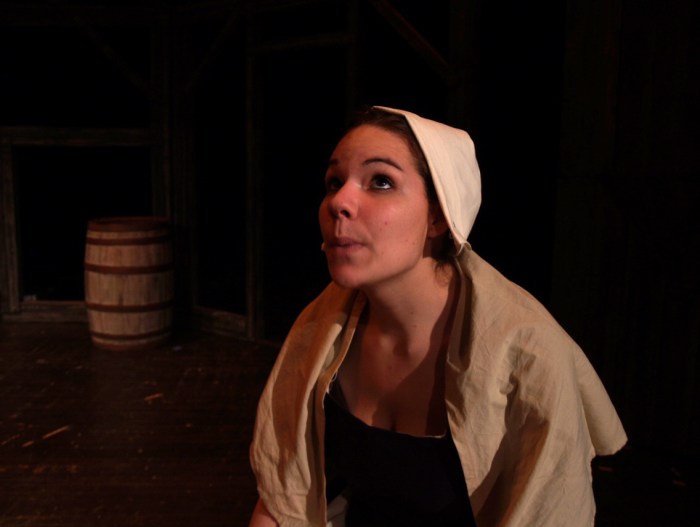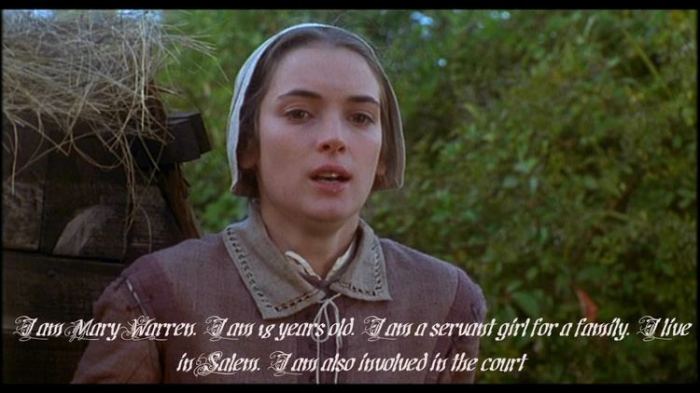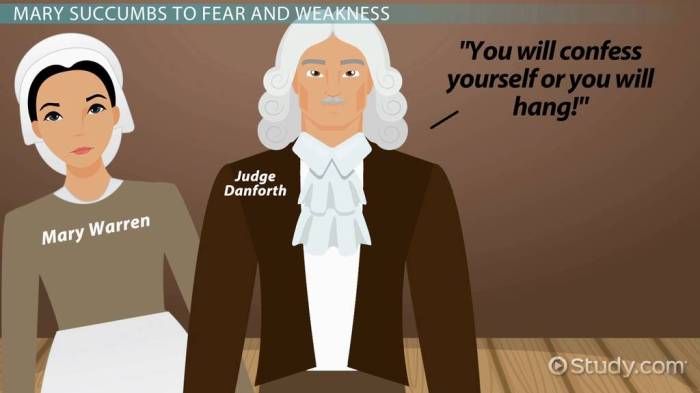The crucible monologue mary warren – In Arthur Miller’s gripping play, “The Crucible,” Mary Warren’s monologue in Act III stands as a pivotal moment, revealing the complexities of her character and the profound impact of the Salem witch trials.
Mary Warren, a young servant in the household of Reverend Parris, initially accuses Abigail Williams of witchcraft. However, as the trials intensify, she recants her testimony, sparking a chain of events that exposes the truth behind the accusations.
Mary Warren’s Character

Mary Warren plays a pivotal role in Arthur Miller’s “The Crucible.” She is a young servant in the household of Reverend Samuel Parris and one of the first to accuse others of witchcraft during the Salem witch trials. Mary’s motivations are complex, and her relationship with Abigail Williams, the play’s antagonist, is central to her character development.
Mary Warren’s Personality and Motivations
Mary is a timid and impressionable girl who is easily swayed by those around her. She is desperate for acceptance and approval, and her desire to please others often leads her to make poor decisions. Mary’s fear of being an outcast and her desire for power contribute to her involvement in the witch trials.
Mary Warren’s Relationship with Abigail Williams
Mary’s relationship with Abigail is both complex and antagonistic. Abigail is the leader of the group of girls who accuse others of witchcraft, and Mary is one of her followers. However, Mary eventually realizes that Abigail is using the trials to gain power and control.
This realization leads Mary to break away from Abigail and testify against her.
Mary Warren’s Monologue
In Act III of “The Crucible,” Mary delivers a powerful monologue in which she recants her testimony against Abigail and the other accused witches. Mary’s monologue is a turning point in the play, as it reveals her growing courage and independence.
Context and Purpose
Mary’s monologue occurs after she has been arrested for witchcraft. She is brought before the court and forced to testify against Abigail. However, Mary realizes that Abigail is lying and that she has been manipulated by her. Mary’s monologue is her way of breaking free from Abigail’s control and speaking the truth.
Key Themes and Arguments
Mary’s monologue explores several key themes in “The Crucible,” including the dangers of mass hysteria, the importance of individual conscience, and the power of truth. Mary argues that the witch trials are a product of fear and superstition, and that the innocent are being persecuted.
She also emphasizes the importance of speaking the truth, even when it is difficult or dangerous.
Character Development
Mary’s monologue reveals her significant character development. She begins the play as a timid and easily manipulated girl, but by the end of the play, she has become a courageous and independent woman. Mary’s monologue is a testament to her strength and resilience.
Mary Warren’s Testimony
Mary Warren’s testimony plays a significant role in the Salem witch trials. Initially, Mary testifies against Abigail and the other accused witches. However, she later recants her testimony, which leads to her arrest and imprisonment.
Initial Testimony
Mary’s initial testimony is based on her belief that Abigail and the other girls are witches. She claims to have seen them dancing in the woods with the devil. Mary’s testimony is damning, and it helps to convict several people of witchcraft.
Recantation
Mary later recants her testimony after she realizes that Abigail is lying. She confesses that she was afraid of Abigail and that she was pressured into accusing the others. Mary’s recantation is a major turning point in the trials, as it undermines the credibility of the accusations.
Consequences
Mary’s recantation has several consequences for herself and others. She is arrested for witchcraft and imprisoned. Her recantation also leads to the release of several people who had been accused of witchcraft. However, Mary’s recantation does not stop the trials, and many innocent people are still executed.
Mary Warren’s Role in the Trials

Mary Warren’s role in the Salem witch trials is complex and controversial. She is one of the first to accuse others of witchcraft, but she later recants her testimony. Mary’s actions have a significant impact on the trials, and she is ultimately arrested for witchcraft herself.
Role in Accusations
Mary Warren is one of the first to accuse Abigail Williams and the other girls of witchcraft. Her testimony is damning, and it helps to convict several people of witchcraft. Mary’s role in the accusations is controversial, as some historians believe that she was manipulated by Abigail.
However, others believe that Mary was a willing participant in the witch hunt.
Impact on Proceedings
Mary Warren’s recantation has a significant impact on the witch trials. It undermines the credibility of the accusations and leads to the release of several people who had been accused of witchcraft. However, Mary’s recantation does not stop the trials, and many innocent people are still executed.
Ethical Implications, The crucible monologue mary warren
Mary Warren’s actions have several ethical implications. Her initial testimony against Abigail and the other girls is based on lies, and it leads to the wrongful conviction of several innocent people. Mary’s recantation is a step in the right direction, but it does not fully redeem her for her role in the witch hunt.
Mary Warren’s Legacy: The Crucible Monologue Mary Warren

Mary Warren’s story has been interpreted and used in literature and popular culture in various ways. She is often seen as a symbol of the dangers of mass hysteria and the importance of individual conscience.
Historical Significance
Mary Warren’s story is a reminder of the dangers of mass hysteria and the importance of individual conscience. The Salem witch trials were a dark chapter in American history, and Mary Warren’s story is a reminder of the importance of speaking out against injustice.
Literature and Popular Culture
Mary Warren’s story has been adapted into several works of literature and popular culture. She is a character in Arthur Miller’s play “The Crucible” and in several other novels and films. Mary Warren’s story has also been used to explore themes such as the dangers of mass hysteria and the importance of individual conscience.
Enduring Relevance
Mary Warren’s story is still relevant today. It is a reminder of the dangers of mass hysteria and the importance of individual conscience. Mary Warren’s story is a valuable lesson for all of us, and it is one that we should never forget.
Answers to Common Questions
What is the significance of Mary Warren’s relationship with Abigail Williams?
Abigail’s manipulative nature and desire for revenge drive Mary’s initial accusations against her.
Why does Mary Warren later recant her testimony?
She realizes the danger of the accusations and fears for her own safety.
What are the ethical implications of Mary Warren’s actions?
Her initial false accusations contribute to the wrongful convictions of innocent individuals.